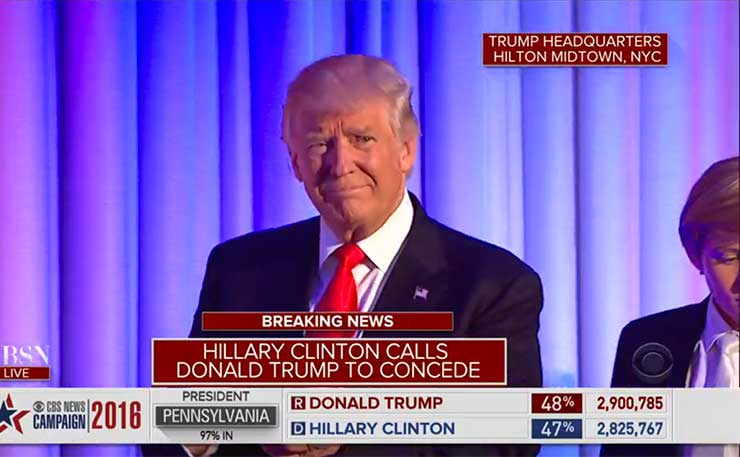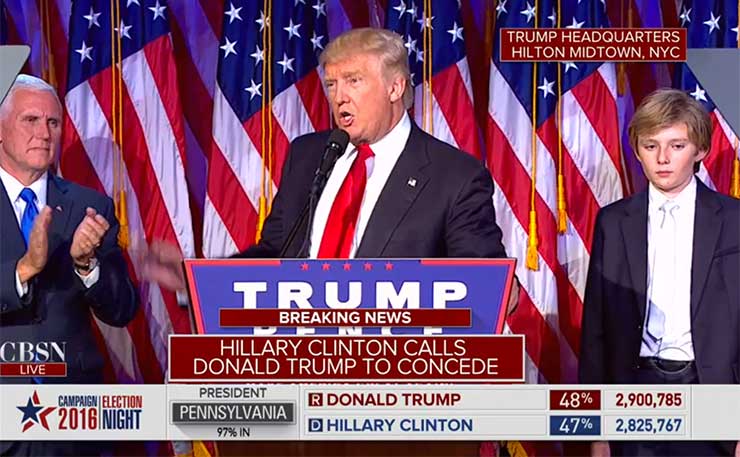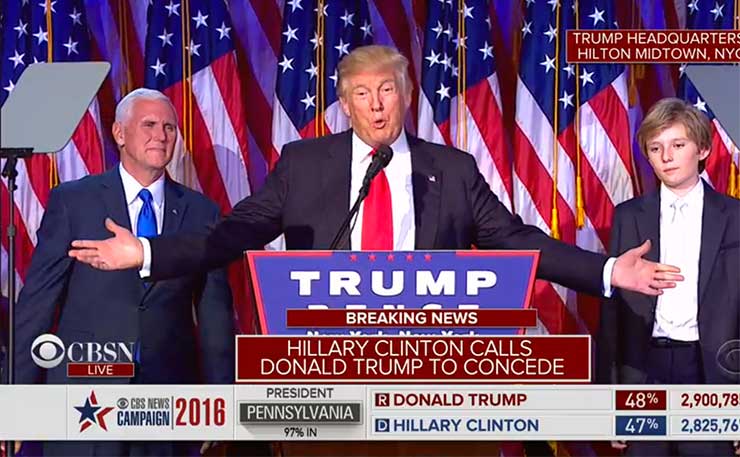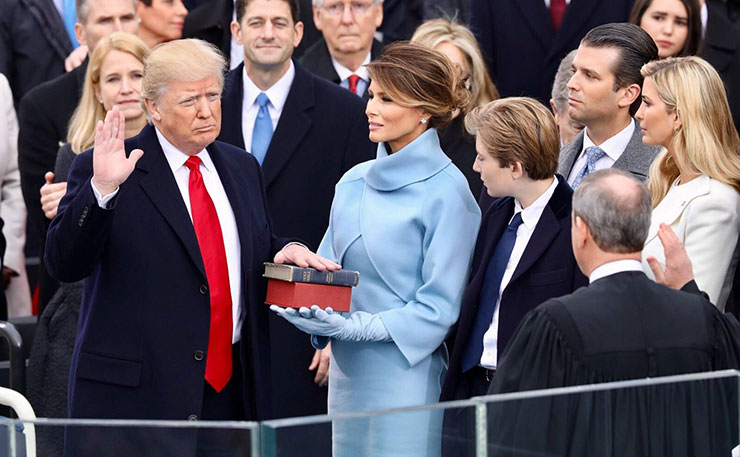US voters and pundits have been insulated by the assumption Donald Trump could not be taken literally. That’s proving to have been a dangerous mistake, writes Max Chalmers.
For the sceptical viewer of reality television, the genre can never quite wow in the manner of documentary. No matter the outrages and antics, the knowledge that behind the scenes characters are being prodded in this or that direction, that some light scripting may be responsible for the zingers and clangers, undermines the spectacle.
That’s what following the US election felt like. Donald Trump, a reality television star, may have been pushing every button, summoning every scandal in a humiliating bid to keep us entertained, but the show would soon end. The great catchphrases, “lock her up”, “build the wall”, would fade away.
The real questions appeared to be what his rise this far could tell us about the state of America, and what kind of a regime Hillary Clinton would oversee.
This week, finally, reality has set in.

Trump has kicked off his time in office with the same fearsome authoritarian rhetoric that carried him through the campaign, now filled out with the unbelievable power of the American state. Incoherent as they often were, the words are being converted into actions.
In a series of executive orders, Trump this week revived the Keystone XL pipeline and Dakota Access pipeline. It’s clear the US will be moving rapidly away from climate action, with Trump surrounding himself with climate deniers, not least of whom is Environmental Protection Agency pick Scott Pruitt.
The head of the world’s largest non-state oil and gas company will be his Secretary of State. Was Trump really joking when he Tweeted that climate change was a hoax perpetrated by the Chinese? It doesn’t matter, he’ll govern as if it is.
Trump has also moved early on anti-immigration policies. The wall was not just a metaphor or rallying cry. He’s going to build it, or at least try. And he’s going to try to make Mexico pay for it too. This week saw the first steps taken towards restricting Muslim entry to the US. False allegations of massive voter fraud have continued, in what will likely become an effort to crack down on minority voter turnout.
Living here, it’s impossible not to be shocked by the daily orders now emanating from the White House. Trump’s outrageous excess seemed to indicate his words never carried real weight. It was a reassuring delusion that some saw through before the race was over.

In a valiant effort at soothsaying prior to the election, New Yorker writer Evan Osnos attempted to investigate what President Trump would or would not be able to do after taking office. Included in the piece was this worrying survey of the efforts previous Presidents have made when it comes to fulfilling their promises:
“…campaigns offer a surprisingly accurate preview of Presidencies. In 1984, the political scientist Michael Krukones tabulated the campaign pledges of all the Presidents from Woodrow Wilson to Jimmy Carter and found that they achieved seventy-three per cent of what they promised. Most recently, PolitiFact, a nonpartisan fact-checking site, has assessed more than five hundred promises made by Barack Obama during his campaigns and found that, to the irritation of his opponents, he has accomplished at least a compromised version of seventy per cent of them.”
Trump is not, of course, an average President. His refusal to acknowledge even self-evident truths surely makes it harder to believe his promises. But writing shortly after the election, Russian-American journalist Masha Gessen, who has published a book on the rise of Putin, warned that not taking Trump’s promises literally was a mistake. Gessen outlined six rules for living in an autocracy. Rule number one: “believe the autocrat”.
As a number of US journalists and writers are now acknowledging, the much-touted idea that Trump should be taken seriously but not literally is collapsing with every stroke of his newly-powerful pen. The dangerous assumption that someone who spoke and acted with an autocratic tenor would become a democrat after taking power has been revealed as just that.

That’s why Australians should not simply ignore the attention-grabbing antics of Pauline Hanson or George Christensen. Hanson has vowed to ban halal, surveil Muslims, and alter the section of the constitution protecting the free exercise of religion. Christensen has backed the rounding up of “suspected” drug traffickers and manufacturers to face police interrogation, while stating his hope Australia will learn from Philippine President Rodrigo Duterte, who he wrongly believes has not overseen a massive campaign of extra-judicial assassinations.
These thought bubbles may seem too outlandish to be tested in Australia. Don’t think Hanson et al won’t try if given the chance. Before the 2013 election it did not seem conceivable that Tony Abbott would have the navy physically turn around boats carrying men, women, and children and send them back to sea. That was clearly naïve.
The difficulty is that those like Hanson, Christensen, and especially NSW libertarian Senator David Leyonhjelm, are experts at concocting outrage in order to gain further attention, latching on the unflappable impropriety of their alt-right cousins in the United States. They anticipate and welcome such coverage: it’s the oxygen that lets their movements grow.
At the same time, failing to be outraged by promises that could be written off as hyperbole is clearly not an option.
Given Australia does not have a presidential system, it’s difficult to see how such an individual could bring their radical agenda to the fore as rapidly as Trump (and his clique of fringe-right advisors) has. But make no mistake. What they say today is not mere rhetoric.
Donate To New Matilda
New Matilda is a small, independent media outlet. We survive through reader contributions, and never losing a lawsuit. If you got something from this article, giving something back helps us to continue speaking truth to power. Every little bit counts.





